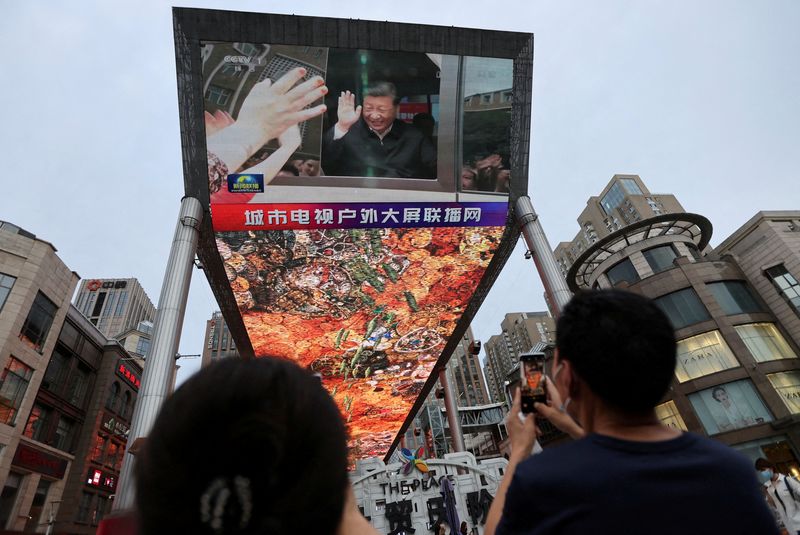U.S. committee demands reasons for lack of Xinjiang sanctions
2023.09.19 11:56

© Reuters. FILE PHOTO: A giant screen shows news footage of Chinese President Xi Jinping visiting Xinjiang Uyghur Autonomous Region, at a shopping centre, in Beijing, China, July 15, 2022. REUTERS/Tingshu Wang/File Photo
By Michael Martina
WASHINGTON (Reuters) – The U.S. must fully implement sanctions on China for its Xinjiang policies, a U.S. congressional committee told the State Department, demanding reasons why Washington had yet to put restrictions on some officials linked to abuses in the Chinese region.
Congress in recent years has passed laws to pressure China over what the State Department says is an ongoing genocide of Uyghurs and other largely Muslim minority groups from Xinjiang.
But the House of Representatives select committee on China said in a letter that the Biden administration has not issued sanctions under one of those laws – the Uyghur Human Rights Policy Act (UHRPA) passed in 2020 – which requires the U.S. president, absent a waiver, to identify and sanction Chinese officials responsible for abuses.
Beijing denies any abuses in Xinjiang.
The U.S. has sanctioned a handful of Chinese officials and entities linked to Xinjiang under various channels, including the Global Magnitsky Act and by executive order, actions that activists say are inadequate to the scale of atrocities committed.
“The United States must take action to hold PRC (People’s Republic of China) perpetrators accountable and thus disincentivize further human rights abuses against the Uyghurs and other groups,” Mike Gallagher, the committee’s chair, said in a letter to Secretary of State Antony Blinken and Secretary of Homeland Security Alejandro Mayorkas.
Some Xinjiang experts say that alleged mass internment of Uyghurs peaked in 2018, but that abuses have continued with forced labor and labor transfers becoming more prominent.
The letter, dated Sept. 19, asked Blinken and Mayorkas to explain why certain Chinese officials, including Xinjiang Communist Party secretary Ma Xingrui, had not been sanctioned given their role in formulating and executing China’s crackdown.
It also asked the Department of Homeland Security (DHS) to explain why dozens of Xinjiang-linked companies had not been added to an entity list under the Uyghur Forced Labor Prevention Act that would bar their imports.
The State Department has long been mulling sanctions under UHRPA, but Reuters reported in May that related measures were among policies delayed in the wake of a diplomatic crisis spurred by the U.S. downing of a suspected Chinese spy balloon that flew over U.S. soil earlier this year.
The Biden administration has argued it never pulls punches on China, but senior officials have recognized the importance of properly “sequencing” policies.
“This administration has utilized, and will continue to utilize, a variety of tools and diplomatic tactics to promote accountability for the PRC’s ongoing genocide and crimes against humanity against Uyghurs and members of other ethnic and religious minority groups in Xinjiang,” a State Department spokesperson said.
DHS did not respond immediately to a request for comment.
Chinese leader Xi Jinping visited Xinjiang in August and said maintaining social stability was a top priority, comments activists viewed as him doubling down on his approach.
“(Xi) feels no pressure to pretend that they are doing anything other than continuing down this path,” said Julie Millsap of the Washington-based Uyghur Human Rights Project.








